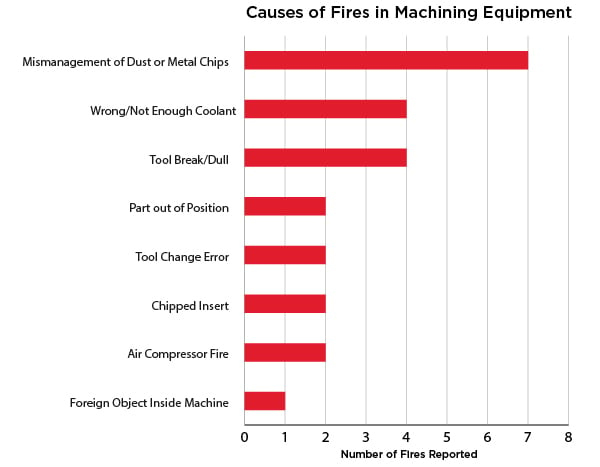Most experienced machinists have seen at least one fire on the job. Cutting metals at high speeds creates plenty of opportunities for sparks to ignite flammable materials. Many fires in machine shops are preventable, either by minimizing sparks or making sure they do not ignite flammable materials. But mistakes can happen. Our analysis of 24 fires in machine shops shows that one mistake, in particular, causes almost 30% of all fires.
The #1 Cause of Fires in Machine Shops
Our research shows that the leading cause of machine shop fires is mismanagement of dust and/or metal chips. Our findings were gathered from reports of fire incidents in the news, on social media, and interviews with our customers, who have had fires suppressed by CNC fire suppression systems.

The reason that mismanagement of dust or metal chips causes so many fires is that when dust or metal chips accumulate, it is easy for a spark to catch them on fire. Metal chips collect in chip pans when not cleaned regularly. Shops should prioritize regular cleaning of chip pans, especially when machining multiple different materials. Similarly, when disposing of chips in a chip bin, it is important to keep the bin away from machines that might throw sparks. Chip bins should also be kept free of trash and other debris. Filters and dust collectors can help contain flammable dust from processes such as deburring. Consider using flame retardant filters for extra protection.
Other Common Causes of Fires in CNC and EDM Machines
The next most common cause of fire is a tie between tool breaks and coolant errors. When a machine tool breaks, it can crash into another tool or otherwise malfunction, which typically produces a lot of sparks. In turn, the sparks can ignite the part being machined or – more frequently – ignite the coolant, which typically has a lower flashpoint.
Improper use of coolant can also lead to a fire. Coolants dissipate heat, so if you do not use the correct amount, then heat can build up and start a fire. This is especially true in high-speed machining applications. Pay attention to the type of coolant you are using: oil-based coolants are not as effective at dissipating heat compared to other types of coolants. If you are using an oil-based coolant, be aware of the fire risk, especially when running a new program using oil as the coolant. Clean agent fire suppression systems are highly effective at putting out coolant fires. The right kind of fire extinguisher can also be effective if used quickly by a trained operator.
The top three causes of fires in machine shops contribute over 60% of all fires analyzed. Other reported causes of fire include:
- Parts out of position
- Tool change errors
- Chipped inserts
- Pocketing cuts, which leave flammable dust inside of a pocket
- Air compressor fires
- Foreign objects inside of the machine
Factors that Increase Your Fire Risk
All fires start due to a combination of heat (or sparks), a fuel (such as oil coolant), and oxygen. The common causes of fires in machine shops typically introduce one or more of these fire risk elements. For example, a part that is out of position generates heat and sparks.
While a fire can happen in any machine shop, some shops are at higher risk than others due to the type of parts they are machining. Precision machine shops working on aerospace and medical parts work with more oil-based and high-pressure coolants, for example. Shops running jobs with long cycle times, especially those that run machines unattended, have to be extra vigilant about addressing fire risks. A fire may have time to grow before someone notices it. Finally, pay special attention to fire risks when running a program for the first time. It can be hard to predict the effect that new a program will have on your coolant and tooling, so proceed with caution, in case of something unexpected.

